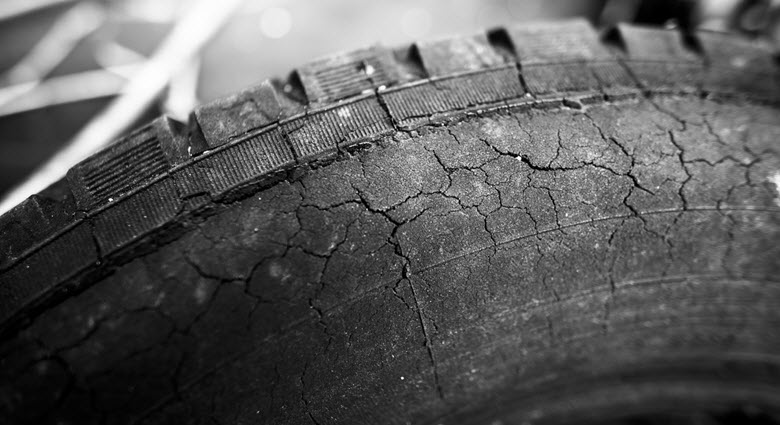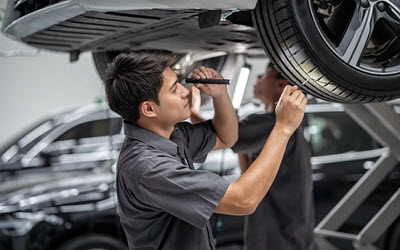The Dangers of Driving a BMW with Worn-Out Tires

As an owner of a BMW, prioritizing safety on the road is of utmost importance. One key area often neglected by drivers is tire condition. Worn-out tires present serious threats when driving high-performance vehicles like BMWs. Let’s investigate worn-out tire problems from their causes to the dangers they pose, as well as ways to resolve and avoid these problems and discuss the benefits of regular repair and maintenance of your tires.
Recognizing the Problem: Causes and Signs of Worn-out BMW Tires
Causes for uneven tread wear may include insufficient tire rotation. When tires aren’t rotated regularly, uneven wear occurs, leading to faster tread wear on certain tires and increased tread wear for other tires.
Here are some of the causes of worn-out BMW tires:
- Improper inflation: overinflated or underinflated tires can also contribute to uneven tread wear while shortening tire lifespan.
- Alignment issues: Poor wheel alignment can result in uneven tire wear and premature tread wear.
Signs of worn tires include:
- Decreased Tread Depth: Check for wear bars built into the tire to determine when to replace them if they appear level with tread depth.
- Uneven tread wear: Check the tire surface for irregular tread wear patterns, such as excessive wear on one side or in the center. Bulges or cracks: Look for bulges, cracks, or cuts in the sidewalls that indicate tire weakness and possible failure.
- Vibration and noise: Worn-out tires may produce increased vibration or cause unusual driving sounds, leading to unexpected symptoms like vibration and noise issues.
The Perils of Driving with Defective Tires on Your BMW
Driving with worn-out tires compromises both your safety and performance.
- Diminished grip: Worn-out tires often experience diminished grip on the road, which results in compromised handling, longer braking distances, and difficulty managing their vehicle. This leads to compromised handling, problems controlling it when braking or maneuvering, and more challenges maneuvering it around corners.
- Increased Risk of Hydroplaning: Low tread depth makes tires more prone to hydroplaning, diminishing control over the vehicle in wet conditions for drivers.
- Puncture Risk: Worn-out tires are more vulnerable to punctures from sharp objects, leading to sudden air pressure losses or potentially catastrophic blowouts. This poses a greater threat than tires with sufficient air pressure reserves.
- Poor Performance in Adverse Weather: Tires with insufficient tread depth struggle to provide enough traction on snowy or icy surfaces, creating a significant safety risk during winter driving.
- Reduced Stability: Worn-out tires reduce vehicle stability and control, increasing the chances of skidding, loss of control, and potential accidents.
- Lengthened Braking Distance: Worn-out tires require longer braking distances to stop, increasing the risk of rear-end collisions or being unable to avoid obstacles.
How to Solve and Avoid These Issues
- Timely Tire Replacement: Regularly inspect and replace your tires when necessary, considering factors like tread depth, uneven wear, and sidewall damage.
- Proper Tire Rotation: To maximize tire lifespan and ensure even tread wear, follow the manufacturer’s recommended rotation pattern when rotating tires.
- Proper Tire Inflation: Regularly monitor tire pressure and adjust accordingly, as proper inflation promotes even wear and optimal performance.
- Wheel Alignment: Regular wheel alignments will correct misalignments that lead to uneven tire wear and reduce misalignments that could otherwise cause uneven tread wear.
- Seasonal Tire Replacements: When wintertime rolls around, consider switching to dedicated winter tires for enhanced traction on snow and ice.
Advantages of Scheduling Timely Tire Repair and Maintenance
- Increased Safety: Well-kept tires enhance vehicle stability, handling, and traction to reduce the risk of accidents and ensure maximum vehicle stability.
- Improved Performance: Tires that have been properly inflated can greatly enhance performance. Improvements can be seen in brake responsiveness, cornering stability, and overall driving experience.
- Extended Tire Lifespan: Maintaining tires through regular rotation and alignment helps distribute wear evenly across their surface area, prolonging their lifespan.
- Fuel Efficiency: Maintaining tires to reduce rolling resistance results in greater fuel efficiency and reduced carbon emissions.
- Cost Savings: Addressing tire issues quickly can save money in repairs for tire-related accidents or unexpected tire replacement.
Avoid BMW Tire Problems With Munich West
Driving a BMW with worn-out tires poses serious  dangers on the road. You can ensure its safety, performance, and longevity by understanding its causes and signs, identifying its associated risks, and taking proactive steps to remedy and avoid this issue.
dangers on the road. You can ensure its safety, performance, and longevity by understanding its causes and signs, identifying its associated risks, and taking proactive steps to remedy and avoid this issue.
Regular tire maintenance services and replacement practices recommended by tire service providers should help maintain optimal conditions on your BMW tires for an enjoyable driving experience. Don’t compromise safety. Contact us at Munich West in Decatur and Atlanta, GA for expert assistance today.




